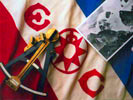|
Members
- Roster
Page
- Member's Biographies
- Member's
Books and Videos
- Awards
- Student
Members
- Past
Members
Expeditions
- Member
Expeditions
- Media Coverage
- Historic Greater
Piedmont Explorers
Events
- Future Outings
- Past Outings
- Future Meetings
- Past Meetings
Explorers
Club Resources
- Expedition
Planning
- Expedition
Funding
- Field Science Sites
- Field Research Centers
Join
The Explorers
- Become
a Member
-
About the Club
- Chapter Leadership
- Club Chapters
History
- Chapter History
- The Explorers Club Journal
Contact
Us
- Explorers
Club
- Explorers
Club HQ
|
2010 Meetings
November
Speaker: Dr. Stewart B. Nelson
Topic: "Re-Discovering the World's First Arctic Submarine: Nautilus of 1931"
Many considered it foolhardy but Australia-born explorer Sir Hubert
Wilkins was determined to be the first to use a submarine to cross the
Arctic Ocean by way of the North Pole. At the Pole, he planned to drill
up and rendezvous with the airship Graf Zeppelin. A decommissioned U.S.
Navy WW I submarine was leased in 1930 and extensively modified for
under-ice operation. Christened the Nautilus, the submarine reached the
icepack but sabotage forced a return to Bergen, Norway and there the
world’s first Arctic submarine was scuttled in a fjord in late 1931.
In
September 2005, Dr. Stewart B. Nelson led an Explorers Club Flag
Expedition that re-discovered the mostly forgotten Nautilus. The
Wilkins-Ellsworth Trans Arctic Submarine Expedition of 1931 is
certainly worthy of being remembered. Among the civilian crew of his
submarine Nautilus was diver Frank Crilley, a holder of the
Congressional Medal of Honor, and scientist Harald Sverdrup who would
later become director of Scripps Institution of Oceanography in La
Jolla, California. 2008 was the 50th anniversary of the nuclear
submarine Nautilus making the first submerged transit of the Arctic
Ocean by way of the North Pole – the very thing that Sir Hubert
attempted to do in his submarine Nautilus back in 1931. 2008 was also
the 50th anniversary of Sir Hubert’s death. Additionally, 2008 marks
the death of the last surviving crew member of Sir Hubert’s submarine
Nautilus.
Stewart B. Nelson has been involved in a wide variety
of ocean-related activities. He earned a masters degree from The
University of Rhode Island and a doctorate from the University of
Southern California. The former president of the American Oceanic
Organization, he has numerous awards and honors including Congressional
Fellow and Marine Technology Society Fellow. He is listed in American
Men and Women in Science and Who's Who in Frontier Science and
Technology.
October
Speaker: Dr. John M. Dean
Topic: "Fishery Science and International Policy: A case study of Bluefin Tuna and
Swordfish in the Mediterranean Sea"
Dr. John M. Dean: Distinguished Professor Emeritus Marine Science Program
and Biological Sciences, Senior Fellow in Science and Ocean Policy, Baruch
Institute, University of South Carolina.
BA Cornell College of Iowa, 1958; MS, 1960 and PhD, 1962 Aquatic Ecology
Purdue University, Post doctorate, Duke University Marine Laboratory 1962-3,
General Electric Company and Battelle Memorial Institute Richland, Washington
1963-70, Faculty in Marine Science, University of South Carolina 1970-2002.
His research emphasizes the age and growth of recreationally and commercially
important fishes in fresh water, estuarine and oceanic ecosystems and
environmental resource policy and management. His laboratory developed several
key methods for the use of otoliths to age larval, juvenile and adult fishes,
and especially pelagic fishes. His laboratory is well recognized for training
international researchers in these methods. He has taught graduate and
undergraduate courses in introductory biology, zoology, ecology, biology of
fishes and science and public policy. He was a Japan Society for the Promotion
of Science Fellow in the Faculty of Fisheries of Hokkaido University, Hakodate,
Japan in 1977 and Distinguished Visiting Professor at Nagasaki University
Faculty of Fisheries, Nagasaki, Japan in 1985. He regularly works with his
colleagues in Japan on fish ecology, fishery resources and habitat utilization.
In 1999, he was Visiting Professor of Fisheries Ecology at the University of
Cagliari, Sardinia, Italy. Dr. Dean and his students have conducted research
projects on the ecology of tuna and swordfish in the Mediterranean Sea and
Atlantic Ocean and he collaborates with colleagues in Italy, Japan, France,
Netherlands, Greece and Turkey. He has more than 100 publications in the
refereed literature and numerous technical reports. Dr. Dean was awarded an
honorary Doctor of Science degree by Cornell College of Iowa in 2003.
His service on numerous advisory committees dealing with natural resource
issues, and the role of science in the development and implementation of natural
resources policies at the domestic and international level enables him to bring
a unique perspective to his students and to policy makers. Dr. Dean served on
the Committee on Technology and Marine Habitats and the Committee to Identify
High-Priority Science to meet National Coastal Needs for the National Research
Council of the National Academy of Sciences. He served on the South Carolina
Coastal Council (1979-83), and was a member of the South Carolina Coastal
Council Blue Ribbon Committee for Coastal Zone Management (1987). He served
three terms on the South Atlantic Fishery Management Council, 1987-90 and
1999-2006. He chaired the Highly Migratory Species committee as well as serving
on several other committees of the council and was the council delegate to the
US ICCAT Advisory Committee. He served four terms on the United States Advisory
Committee for the International Commission for the Conservation of Atlantic
Tunas and was chairman 1992-96. Upon completion of his third term on the SAFMC,
he was appointed to their external Science and Statistics Committee. Professor
Dean was appointed to the South Carolina Heritage Trust Advisory Board (1991-97)
and was a member of the Advisory Board of the Land and Water Division of the
South Carolina Department of Natural Resources from 1992-2007. For over 20
years, Dr. Dean was the convener of the session on Natural Resources and the
Environment for Leadership South Carolina. He serves as a consultant to several
seafood and restaurant companies, including the Ponte Vecchio Ristorante in
Boza, Italy, Trattoria Lillicu in Cagliari, Italy, and Blue Marlin in Columbia,
South Carolina. He has recently been appointed to the Frenzy Sport Fishing Team,
Columbia, SC and Costa Rica to develop scientific principles for their
recreational fishing business. He helped form and is currently a member of the
Steering Committee of the South Carolina Sustainable SeafoodInitiative. The
South Carolina Supreme Court appointed him to the South Carolina Commission on
Judicial Conduct from 2001-2011. The South Atlantic Regional Fisheries
Management Council has recently appointed him to a three year term on the
Information and Education Advisory Committee.
September
Speaker: Dr. Claudia R. Benitez-Nelson
Topic: "Dangers in the Deep: Possible long term impacts of harmful algal blooms along the coast."
Dr. Claudia R. Benitez-Nelson received her Ph.D. in Oceanography
from the Woods Hole Oceanographic Institution/Massachusetts Institute
of Technology Joint Program in 1999. After a postdoctoral
fellowship at the University of Hawaii, sponsored in part by a NOAA
Postdoctoral Fellowship in Climate Change, she joined the University of
South Carolina (USC) in 2002. Dr. Benitez-Nelson is a Professor
in the Department of Earth & Ocean Sciences and the Director of the
Marine Science Program at USC. Her research focuses on
understanding the ocean’s role in climate change, as well as human
impacts on nutrient biogeochemistry and coastal ecology. Dr.
Benitez-Nelson is a diverse scientist, with expertise in
radiochemistry, nutrient biogeochemistry, and harmful algal bloom
toxins. Over the past decade, she has authored or co-authored
more than 55 papers, including several in the journals of Nature and
Science, and two Oceanography Lab Manuals for Freshman Marine
Scientists. Dr. Benitez-Nelson has garnered over 3.5 million
dollars in research support from a number of federal and state
agencies. Her many research honours include the Early Career
Award in Oceanography from the American Geophysical Union in 2006, one
of the highest honours in the field. In 2010 she was named one of
USC’s Rising Stars. Dr. Benitez-Nelson is also highly regarded as
a teacher and mentor, having received the National Faculty of the Year
Award from the National Society of Collegiate Scholars in 2005 and
USC’s Mungo Teaching Award in 2006. Dr. Benitez-nelson currently
serves as an Associate Editor of Limnology and Oceanography-Methods and
Marine
Chemistry, as an elected Councillor of the Oceanography
Society, and is a member of Advisory Committees to the Geoscience
Directorate of the National Science Foundation and the Environmental
Protection Agency.
July
Speaker: Alan H. Shoemaker
Topic: "Eating
Among Prehistoric Mammals: What we know about the biology of extinct
mammals of The White River Badlands of Eastern Wyoming and why."
Alan Shoemaker is a graduate of Furman University
(1967); in 1972 he obtained a Master of Science degree in Biology from the University of South Carolina. Mr. Shoemaker worked at Riverbanks Zoological
Park from 1972 until his
retirement in May, 2002. During his
tenure at Riverbanks, he held the position of Curator of Mammals and Collection
Manager. He also holds the position of
Adjunct Professor in the Dept. of Biology, University of South
Carolina.
Although
retired, he remains active in several IUCN Specialist Groups, including the
Tapir Specialist Group in which he continues to serve as that group’s Red List
Authority. In recognition for his work,
Mr. Shoemaker was made an Honorary member of the AZA. Mr. Shoemaker has authored over 125 refereed
and professional papers, and over 100 popular articles. Prior to attending graduate school, Mr.
Shoemaker served in the U.S. Army for two years, including a seven-month of
tour in Vietnam.
Topic: "Eating Among Prehistoric Mammals:
What we know about the biology of extinct mammals of The White River
Badlands of Eastern Wyoming and why.".
This
talk is the culmination of 13 collecting trips to a world famous mammal
fossil site near Douglas, Wyoming which contains dozens of species of
extinct species such as camels, rhinoceros, horses, oredonts and
more. Sample specimens that demonstrate their lives and diets
will be available. A short resume is attached as is a picture
from last month's collecting trip.
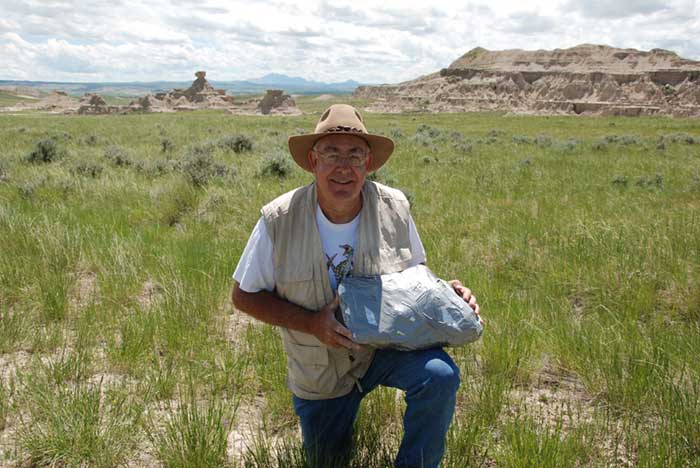
June
Speaker: Harry Brooks
Topic: "1993
Coral Reef Survey to Butaritari (Flag 146) and its unintended
consequences. Bringing the Marine Raiders home after 58 years"
Harry
Brooks' South Carolina roots run deep. A January 1970 USC banking and
finance graduate, he worked for C&S Bank in Sumter, while waiting
for his Marine Corps OCS slot in June 1971. Harry was stationed at MCAS
Beaufort for two years flying the F4 Phantom. He also flew F105's in
the Air National Guard. His daughter, Bonnie, is a senior accounting
major at Carolina.
Harry graduated from the Woodrow Wilson
College of Law in 1979 in Atlanta. He started his own business in 1978
and has been self employed as an air safety investigator ever since.
Harry has investigated over 4,000 aviation accidents and incidents. He
has over 9,000 flying hours in a variety of military and general
aviation aircraft.
Brooks has been an Explorers Club Fellow
since 1993. He was the Atlanta Chapter Chair for four years, a Club
Director for six years, Chair of the Legal Committee and the Flag &
Honors Committee, a Nominating Committee member and a speaker at TEC
Tuesday night program. One other very memorable task at The Club was
serving as the Ombudsman for President Faanya Rose. Harry is the new
club assistant treasurer and a current member of the Flag & Honors
Committee.
Harry has carried The Explorers Club Flag on coral
reef surveys to PNG, Belize, Honduras, and Kiribati (Tarawa and
Butaritari). He has also carried our flag to the Peruvian Amazon on
three expeditions.
Program:
1993 Coral Reef Survey to
Butaritari (Flag 146) and its unintended consequences. Bringing the
Marine Raiders home after 58 years.
Harry will tell us about
his expedition to Butaritari and the condition of the island's coral
reef after the United States Marine Corps August 1942 raid and the US
Army's invasion in November 1943. He will also describe how one of his
expedition's members unexpectedly found a skeleton and how this
launched the recovery of 19 missing Marine Raiders.
May
Speaker: Dr. Miles O. Hayes and Dr. Jacqueline
Michel
Topic: "The coastal geology of South Carolina" The coastal geology of South Carolina is
complex, formed by the combined processes of sea level rise, sediment supply,
waves, and tides. The presentation consists of two parts. Part I describes the
general processes and landforms of the coast, explaining the history of how the
South Carolina coast evolved and how processes such as waves, tides, sediment
supply, and sea level rise have combined to produce the modern coastal features
such as barrier islands, deltas, estuaries, tidal flats, and salt marshes. We
include discussion of the impacts of hurricanes, changes in sediment supply that
are both natural and man-made, the beach cycle, and methods to control erosion.
Part II describes in more detail the coastal geomorphology of each of four
compartments: the Grand Strand; the Delta Region; the Barrier Islands; and the
Low Country. Explanations are provided for key features of the coast such as
Carolina bays, capes, barrier islands, and tidal inlets.
Dr. Miles O. Hayes
Dr. Miles O. Hayes is a coastal geomorphologist and
sedimentologist with 50 years of research experience. He has authored more than
250 articles and reports and three books on a range of topics relating to tidal
hydraulics, river morphology and processes, beach erosion, barrier island
morphology, oil pollution, and petroleum exploration.
Based on extensive field experience throughout the
world, he has developed innovative techniques regarding environmental
protection, oil-spill response and shoreline processes. Three of the original
concepts proposed and developed by Hayes are: 1) importance of hurricanes to
barrier island and nearshore shelf sedimentation; 2) the effect of tides on
shoreline morphology and sedimentation patterns; and 3) the environmental
sensitivity index (ESI) for mapping shorelines (with co-author Michel), which
has been applied worldwide.
Hayes' teaching experience includes a range of both
undergraduate and graduate courses while a Professor at the Universities of
Massachusetts and South Carolina. Seventy-two graduate students received their
degrees under his supervision, most of whom are now leaders in their respective
academic, government and industry positions. He is presently chairman of the
Board of Research Planning, Inc. (RPI), a science technology company located in
Columbia, S.C.
Dr. Jacqueline Michel
Dr. Jacqueline Michel is an internationally
recognized expert in oil and hazardous materials spill response and assessment
with a primary focus in the areas of oil fates and effects, non-floating oils,
shoreline cleanup, alternative response technologies and natural resource damage
assessment. She has participated in research projects in 33
countries.
Since 1982, she has been a member of the Scientific
Support Team to the U.S. Coast Guard provided by the National Oceanic and
Atmospheric Administration (NOAA). Under this role, she is on 24-hour call and
provides technical support for an average of 50 spill events per year. She leads
shoreline assessment teams and assists in selecting cleanup methods to minimize
the environmental impacts of the spill.
She has written more than 150 manuals, reports, and
scientific papers on coastal resource impacts, mapping and protection. As a
member of the Ocean Studies Board at the National Academy of Sciences for four
years, she served on four National Research Council committees (chairing two),
and is a Lifetime Associate of the National Academies. One of the original
founders of RPI, which started in 1977, she now serves as the company
president. 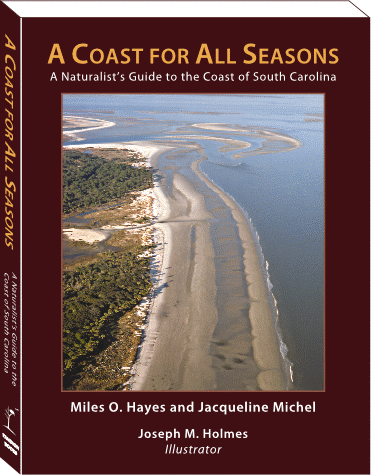
April
Speaker: Dr. Tim Mousseau
Topic: "Exploring the Wilderness of the Chernobyl Zone: Lessons from a Nuclear Disaster"
Professor
Timothy Mousseau received his doctoral degree in 1988 from McGill
University and completed a NSERC (Canada) postdoctoral fellowship in
Population Biology at the University of California, Davis, before
joining the faculty of the Department of Biological Sciences at the
University of South Carolina in 1991. He is currently an Associate Vice
President for Research and Graduate Education.
Professor
Mousseau's experience includes having served as a program officer at
the National Science Foundation, on the editorial board for several
journals, and on NSF, USGS, and a variety of international grant
foundation advisory panels. He has published over 100 scholarly
articles and has edited two books (Maternal Effects as Adaptations,
1998; Adaptive Genetic Variation in the Wild, 2000; both published by
Oxford University Press). He is currently co-editor-in-chief of a new
annual review series, The Year in Evolutionary Biology, published by
the New York Academy of Sciences. He was elected a fellow of the
American Association for the Advancement of Science (AAAS) in 2008.
Dr.
Mousseau and his students have worked on a wide diversity of organisms,
from bacteria to beetles to birds, and his primary areas of research
interest include the genetic basis of adaptation in natural
populations. Since 1999, Professor Mousseau and his collaborators have
explored the ecological consequences of low-dose radiation in
populations of plants, animals and people inhabiting the Chernobyl
region of Ukraine and Belarus. His research suggests that many species
of plants and animals suffer from increased mutational loads as a
result of exposure to radionuclides stemming from the Chernobyl
disaster. In some species (e.g. the barn swallow, Hirundo rustica),
this mutational load has had dramatic consequences for reproduction and
survival. Dr. Mousseau's current research is aimed at elucidating the
causes of variation among different species in their apparent
sensitivity to radionuclide exposure.
A website describing some of this Chernobyl work can be found here:
http://cricket.biol.sc.edu/chernobyl
Some of the press coverage can be found here:
http://cricket.biol.sc.edu/chernobyl/Chernobyl_Research_Initiative/Press_Coverage.html
March
Speaker: Dr. David J. Goldstein
Topic: "Ancient Human-Environment Interactions: Using Historical Ecology to Think about Sustainability."
Historical Ecology has emerged as a
fundamental way for archaeologists, environmental historians,
ecologists, and anthropologists to collaborate on research. This
talk will demonstrate some ways through research in different parts of
the Americas that archaeologists are beginning to develop data for the
comparative use in analyzing contemporary ecological problems. In
advance of the 'From Field to Table' conference that brings together 25
scholars from South Carolina and abroad sponsored by the College of
Arts and Sciences, I will present some of the projects and analytical
frames that will be discussed over the two-day conference.
Dr.
David John Goldstein (Ph.D. Anthropology from Southern Illinois
University, Carbondale), is a visiting scholar at SCIAA during the
2009-2010 academic year. His previous teaching appointments have been
at Northeastern Illinois University, Chicago and the University
Cayetano Hereida, Lima, Perú. He currently works on three major
National Science Foundation projects in Belize, Cuba, and Perú as
either a co PI or consulting ethnobiologist/archaeobotanist. His main
research interest is in the study of organic materials recovered from
archaeological contexts and what they can tell us about ancient
agriculture, medicine, and food production.
February
Speaker: Dr. Abby Sallenger
Topic: “Island In A Storm”
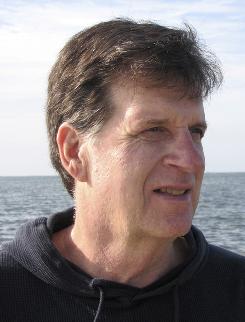 Dr. Asbury (Abby) Sallenger leads the
U.S. Geological Survey’s National Assessment of Coastal Change Hazards that
examines coastal-erosion hazards arising from extreme storms throughout the
United States (see: http://coastal.er.usgs.gov/hurricanes/). This research
utilizes airborne lidar to survey hundreds of kilometers of coast both before
and after extreme storms to detect change. The effort began in the late 1990s,
focusing on the intense winter storms that impacted the U.S. west coast during
the 1997-98 El Nino. Since then, we have investigated the impacts of 12
hurricanes that have made landfall on the U.S. east and Gulf of Mexico coasts,
including 2005’s Hurricanes Katrina and Rita. Dr. Sallenger received both his BA
in Geology and PhD in Marine Science from the University of Virginia. He is the
former Chief Scientist of the U.S. Geological Survey’s Center for Coastal
Geology in St. Petersburg, FL and is presently a research oceanographer at the
Center. Dr. Asbury (Abby) Sallenger leads the
U.S. Geological Survey’s National Assessment of Coastal Change Hazards that
examines coastal-erosion hazards arising from extreme storms throughout the
United States (see: http://coastal.er.usgs.gov/hurricanes/). This research
utilizes airborne lidar to survey hundreds of kilometers of coast both before
and after extreme storms to detect change. The effort began in the late 1990s,
focusing on the intense winter storms that impacted the U.S. west coast during
the 1997-98 El Nino. Since then, we have investigated the impacts of 12
hurricanes that have made landfall on the U.S. east and Gulf of Mexico coasts,
including 2005’s Hurricanes Katrina and Rita. Dr. Sallenger received both his BA
in Geology and PhD in Marine Science from the University of Virginia. He is the
former Chief Scientist of the U.S. Geological Survey’s Center for Coastal
Geology in St. Petersburg, FL and is presently a research oceanographer at the
Center.
I have also included below information
about a prestigious award that he received from the USGS. We expect to have
copies of his book available for a book signing too.
Hurricane and Coastal-Change Expert Abby Sallenger
Wins USGS Shoemaker Award for Lifetime Achievement in Communication
U.S. Geological Survey (USGS) oceanographer Asbury
(Abby) H. Sallenger recently received the USGS Shoemaker Award for Lifetime
Achievement in Communication. The award was announced on August 31, 2007, and
conferred in a formal ceremony at USGS headquarters in Reston, Virginia, on
September 27. Below is the citation for the award.
"The Shoemaker Award for Lifetime Achievement in
Communication honors a USGS scientist who demonstrates great skill in presenting
complex concepts to nontechnical audiences. This lifetime achievement award
honors the recipient's skill and enthusiasm for conveying science in multiple
media.
"This year we
recognize USGS oceanographer Asbury H. Sallenger. The substantial
impact and national recognition of the USGS coastal program is widely recognized
as a direct result of Sallenger's efforts—particularly his skills as
a communicator. Whether it is a briefing on the Hill, a presentation to the
research or local community, or an interview with the media, Sallenger
knows how to communicate the value of USGS science and its relevance to the
audience in question. He has become the voice of the USGS with respect to
hurricanes and coastal change. With an unassuming, can-do
manner, Sallenger attends to multiple demands in the face of a hurricane
and its aftermath, and he has done so repeatedly—during a single season and year
after year—responding to the surge of media requests for interviews, taking
reporters into the field, and keeping managers and support personnel informed.
His ability to communicate the value of the science reaches from the personal
level, inspiring more than 10 of the technicians who have worked for him to
continue their education through the doctorate level, to the national level,
inspiring major media networks to return for additional, in depth
interviews."
To learn more about the scientific work
of Sallenger and his research team, visit "Coastal Change Hazards: Hurricanes and Extreme
Storms" and "National Assessment of Coastal Change
Hazards."
The Shoemaker Awards Competition was established in
1997 in memory of Eugene M. Shoemaker to recognize extraordinary examples
of communicating and translating complex scientific concepts and discoveries
into words and pictures that capture the interest and imagination of the
American public. Shoemaker, a USGS astrogeologist considered the founder
of the science of lunar and planetary geology, was an effective and prolific
communicator, as well as an innovative scientist and researcher. One of his
greatest assets was his ability to communicate scientific concepts to
nonscientists in a way that could be easily understood and appreciated. Today,
many USGS employees carry on his enthusiasm, giving voice to all our science
programs. Book Insider: Island in a Storm
As
we contemplate the future of the upper Texas coastline in the wake of
Hurricane Ike, a valuable new book to read is Island in a Storm, which
centers upon the 1856 Isle Dernier hurricane that killed 200 people and
ended continuous habitation of the popular resort island.
Written
by U.S. Geological Survey scientist Abby Sallenger, the book unwinds
compelling narrative about life in mid-1800s Louisiana, the storm
itself, all while integrating an important public policy message about
the vulnerability of living on unprotected coastlines.
In
addition to its qualities as a finely written narrative, I highly
recommend the book as there are definite parallels between Galveston
Island and Bolivar Peninsula today, and the pre-hurricane Isle Dernier
of the 1850s.
January
Speaker: Dr. Brian Helmuth
Topic: "Living under the sea: an Aquanaut's view of Science and Exploration."
Modern
marine science requires equal parts of high technology equipment and in
knock, down, drag out, in the field exploration. Brian Helmuth
will discuss some of the underwater projects that he and his
collaborators have undertaken, focusing in particular on the Aquarius
underwater habitat, the only civilian facility in the world devoted to
scientific research. Living 60 feet underwater, scientists
(aquanauts) live in an open habitat on the bottom of the ocean for
missions lasting up to 10 days, and thus are able to greatly extend
their working time on the surrounding reefs. Brian will present a
brief history of technical diving, including saturation and mixed gas
techniques, and will talk about some of the work that he and his group
have undertaken using these methods on Caribbean coral reefs.
Dr.
Brian Helmuth is a Professor in the Department of Biological Sciences
at the University of South Carolina in Columbia. Helmuth’s
research explores the effects of climate and climate change on the
physiology and ecology of marine organisms. Specifically, he uses
thermal engineering techniques, including a combination of field work,
remote sensing and mathematical modeling, to forecast the impacts of
climate change on coastal marine animals such as mussels and seastars.
He has also used similar techniques to examine the impacts of
temperature and water flow on tropical corals. A major goal of this
approach is to predict where, when, and with what magnitude the effects
of climate change are most (and least) likely to occur. To date his
work has centered primarily on tropical coral reefs in Florida, the
Caribbean and Central America, and on temperate rocky intertidal
systems in the United States, Europe and South America. Helmuth’s
work has shown some surprising results, and has suggested that our
expectations of where to look for the effects of climate change in
nature can be more complex than previously anticipated. His work
suggests that unless we know where and when to look for impacts of
climate change, many early impacts could go unnoticed. Helmuth
received his PhD in 1997 from the University of Washington in Seattle,
and spent two years as a post-doctoral research associate at Stanford
from 1997-1999. Since 1999 he has served on the faculty at
USC. Helmuth is a Fellow of the Aldo Leopold Leadership program,
which trains select scientists to interact with policy makers and the
public. He regularly works with K-12 teachers throughout South
Carolina and in 2003 was named Marine Educator of the Year by the South
Carolina Marine Educators Association. He has published over 45
peer-reviewed journal articles and is regularly invited to speak at
Universities and symposia throughout the world.
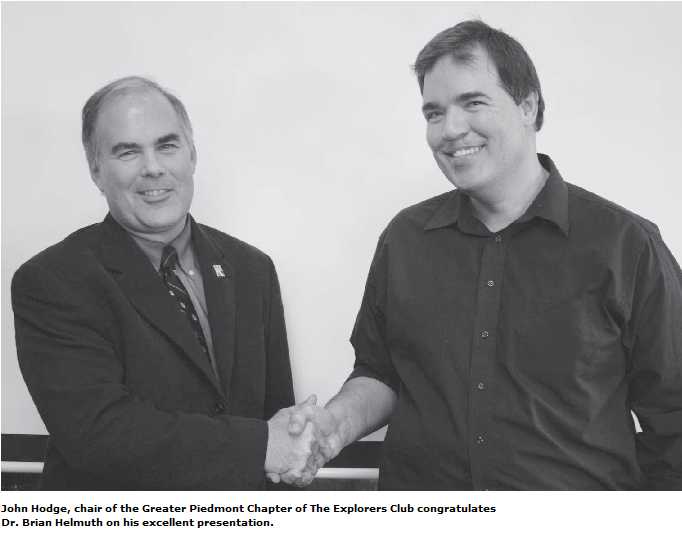
Columbia Star Newspaper article about this meeting
|
